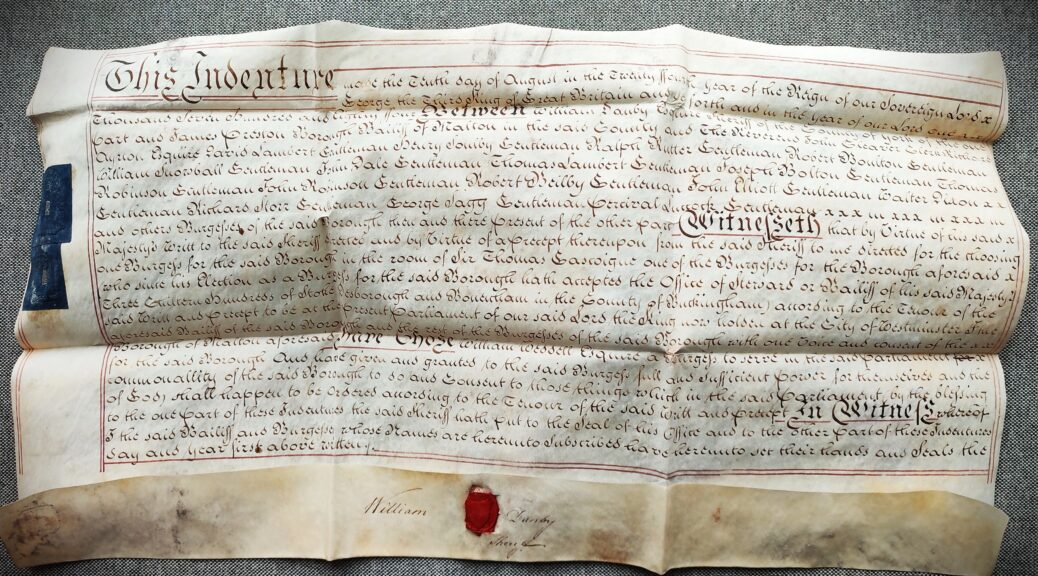
Point to Paper – William wasn’t afraid of a duel, was known for his good taste and was elected to the British House of Commons in 1784
On the 10th of August 1784, William Weddell signed a contract. The contract was between him and Sheriff William Danby along with a number of other local government officials with prescribed mandates. William Weddell had been elected to represent the citizens of the district of Malton in the British Parliament. This was the document that confirmed the case. He had been elected to the House of Commons for the third time. By producing this document, with all the correct signatures and the Sheriff’s own wax seal in place, William Weddell could appear in Parliament and claim his seat in the House of Commons.
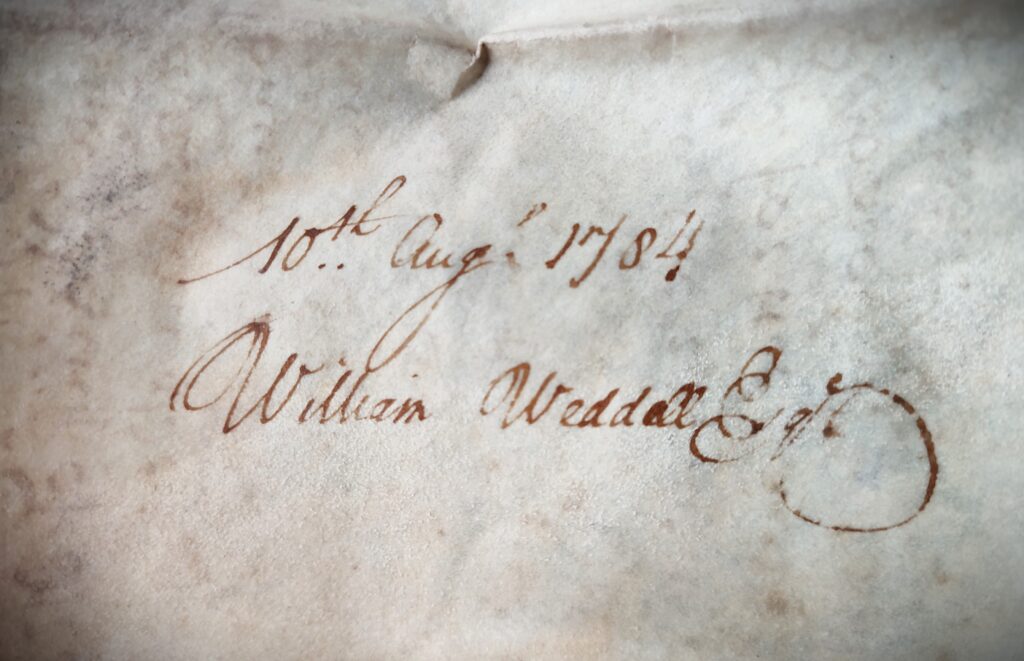
I have been given access to the document itself in the original version. This is the actual document William Weddell used to gain entry to Parliament one late summer day in 1784. It lies here next to me on my desk. I almost want to fly to London and test what would happen if I turned up at the reception of Parliament and showed it. It is amazing that such an interesting document can be obtained at an auction. It is also important to be aware that there are large quantities of British documents from the 18th and 19th centuries for sale. They are usually both affordable and of good quality. They are often written on parchment (“paper” made from animal skin) or vellum (“paper” made from calfskin). They are usually written by hand with a quill or a dip pen and with iron gall ink. The combination of animal skin and iron gall ink means that the documents often have a durability of many hundreds of years. If the documents are well cared for, they can survive for a thousand years or more.
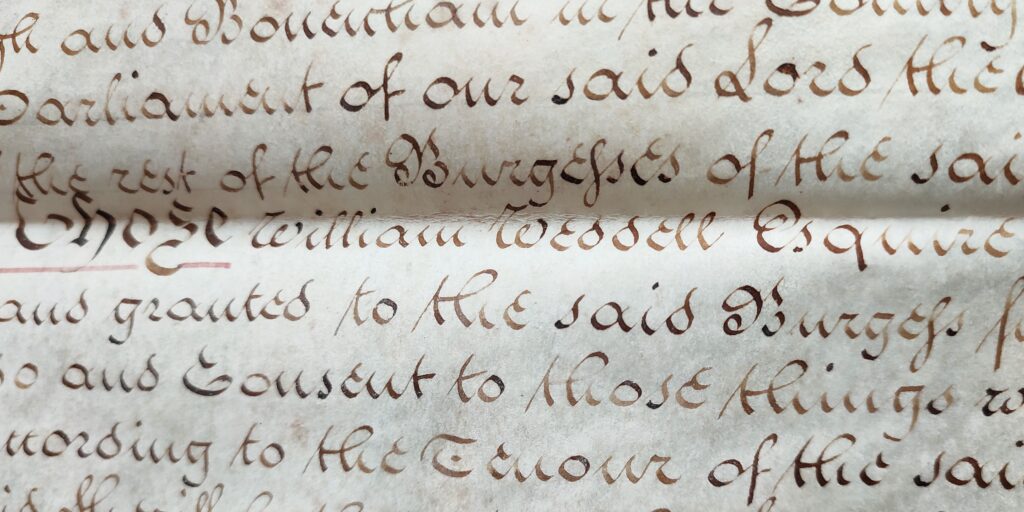
For those of you who want to collect authentic old things with history, and who don’t have a lot of money to spend, British documents are a dream. They not only contain beautifully legible handwriting, but occasionally you can also be lucky enough to get a famous name as part of the bargain. This time I have been really lucky. I collect such documents both because of the beautiful handwriting and the high quality. Just as important for me is that they provide unique and direct access to history. The documents I buy can be the last remnants of memories of people, events and places. In this case, William Weddell’s memory would survive just fine without my interference.
Today’s post is written based on a document I recently got hold of. I think it is exceedingly interesting considering what I paid for it. I wasn’t cheating anyone when I bought it. The seller was fully aware of what he was selling. He is a professional dealer in such old papers. He was probably also reasonably happy with the sale. It tells you something about how many similar documents are available. Stop and think hard about what I am saying here. The document that I have lying next to me is 240 years old! William Weddell himself handled this paper along with others from the British Parliament. Perhaps we could even find remnants of their DNA if we examined it closely.
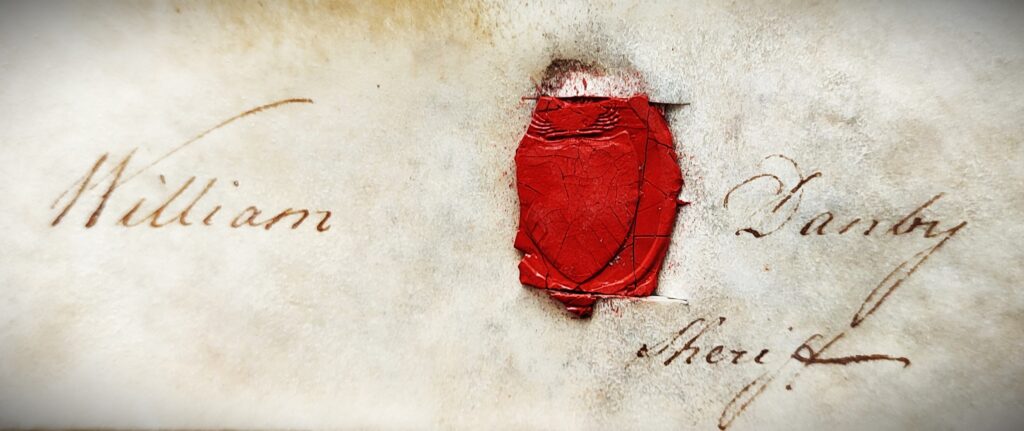
George III was king in 1784. He was the grandfather of the future Queen Victoria. It is also a very long time since Queen Victorias reign. The document I have is a contract with the House of Commons of the British Parliament. Think about that. This Member of Parliament was famous and still has historical interest. If that wasn’t enough, he represented the district of Malton together with the famous philosopher Edmund Burke . That makes me both happy and excited. What about you? I accept that not everyone experiences the same degree of enthusiasm for old weird things as I do, but this old thing is more than just a little bit amazing.
There were many formal things that had to be put in place when you had been elected as a representative in the House of Commons. Among other things, it was necessary to sign a contract. Today’s parliamentarians do it in a similar way. We will get back to the content a bit later. First a few words about William Weddell . There is a bust of him in Ripon Cathedral in North Yorkshire. On the plinth it says: ‘In all the works of Art and genius No Man ever possessed a more correct Judgement, or a more discriminating Taste.’ It is a fresh claim to put on a memorial in a cathedral. Someone actually claims that William Weddell was a genius with the best judgment and the best taste of all people that had ever lived up to this time in history. So, who was this man who was given the place of honor in a cathedral that was established in the 660s? How was it that he was allowed to set up the most beautiful monument in the cathedral?
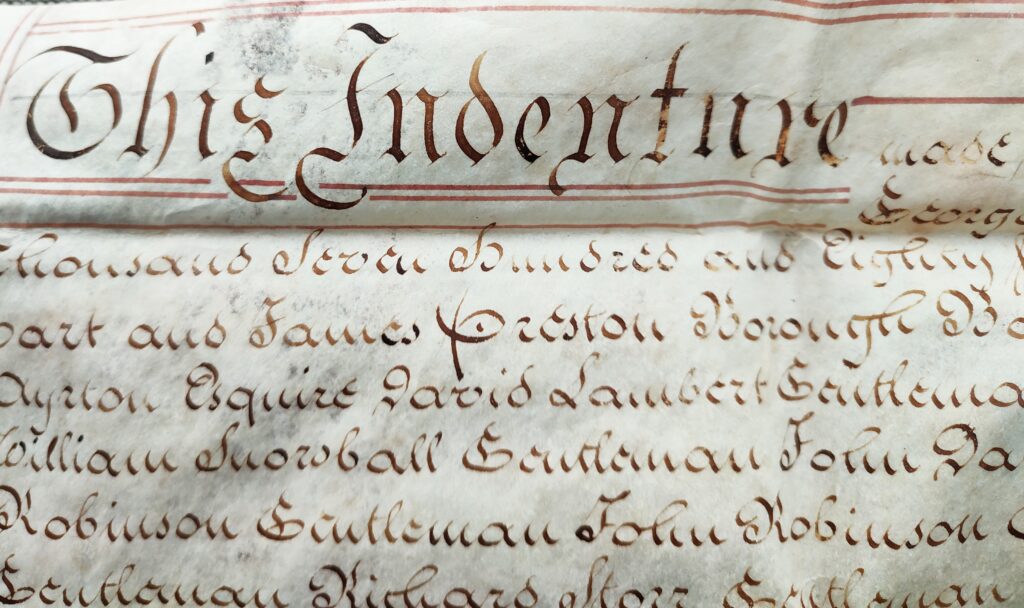
William Weddell inherited great wealth before he was 26 years old. He married some more. He was rich, proud, intelligent and brave. Rumor has it that he once fought a duel against the Duke of Grafton. The disagreement was probably about who had the right to court the widowed Mrs. Harris. I don’t know who won the duel, but at least William survived. I also have no idea if William had an opportunity to court the widowed Mrs. Harris. In any case, William and the widow never married. He married Elizabeth Ramsden instead. She was the half-sister of Lady Rockingham. Lady Rockingham’s husband, the Marquess of Rockingham, became an important supporter of Weddell throughout his life.
By 1762 both of William’s parents had died. In the same year, his older brother also died. He inherited them all. Shortly after the last funeral, he chose to embark on a 3-year educational journey in Europe (Grand Tour). It was common among the wealthy. He came home having become an experienced and refined gentleman. In Rome he had even had his portrait painted by the famous artist Pompeo Batoni. Only the very richest and the most vain received that honor. He also became a collector of tapestries and statues during the same period. Many are still to be found at his magnificent estate of Newby Hall .
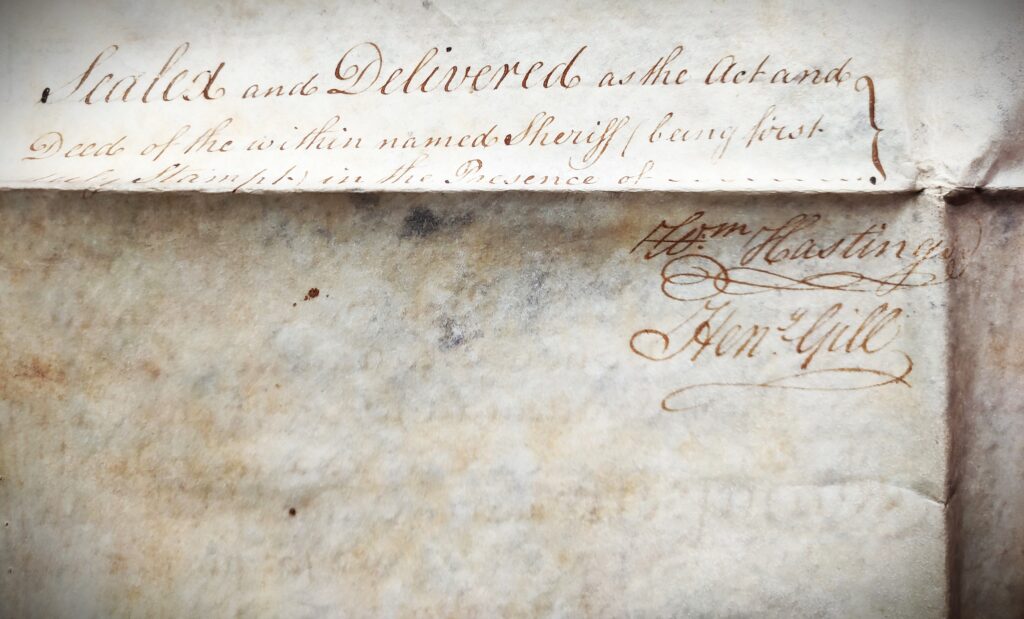
One of the collection’s most famous objects was the Barberini Venus statue. It was bought by William Weddell from the well-known English antiques dealer Thomas Jenkins. Rumor has it that this was the statue that went for the highest price during the entire 18th century. William Weddell had an eye for quality. The statue was sold on to a sheikh from Qatar in 2002 for close to 8 million British pounds. Newby Hall is today a tourist attraction and large parts of William’s collection can still be found there. The collection of statues is considered one of Britain’s finest. Here you will find, among other things, beautiful and famous statues. Some of them are over 2000 years old.
Newby Hall is worth a visit. There is almost no end to the wonderful stories that can be told when you get to know William Weddell and his immediate family. The father of William Weddell’s heir, Lord Grantham the Second, can be argued to be the one who gave away America. That is certainly a great anecdote to tell at any family gathering. Lord Grantham drafted the Declaration of Independence.
On the way up to the billiard room at Newby Hall there hangs a promissory note (IOU) from King Charles II (Charles II) of England. The debt is still not paid. The King owed Sir Robert Vyner 400,000 Guineas (gold coins). A similar number of gold coins would today cost in excess of £70 million. The King was broke when he came home from exile and had to have financial help. Sir Robert Vyner came forward as the King’s personal banker. Sir Robert Vyner was in his time England’s richest man and made, among other things, the crown with which King Charles III (2022) was recently crowned. The descendants of Sir Robert Vyner can claim that King Charles II was the first in England to go into personal bankruptcy and that the family helped save the royal household.
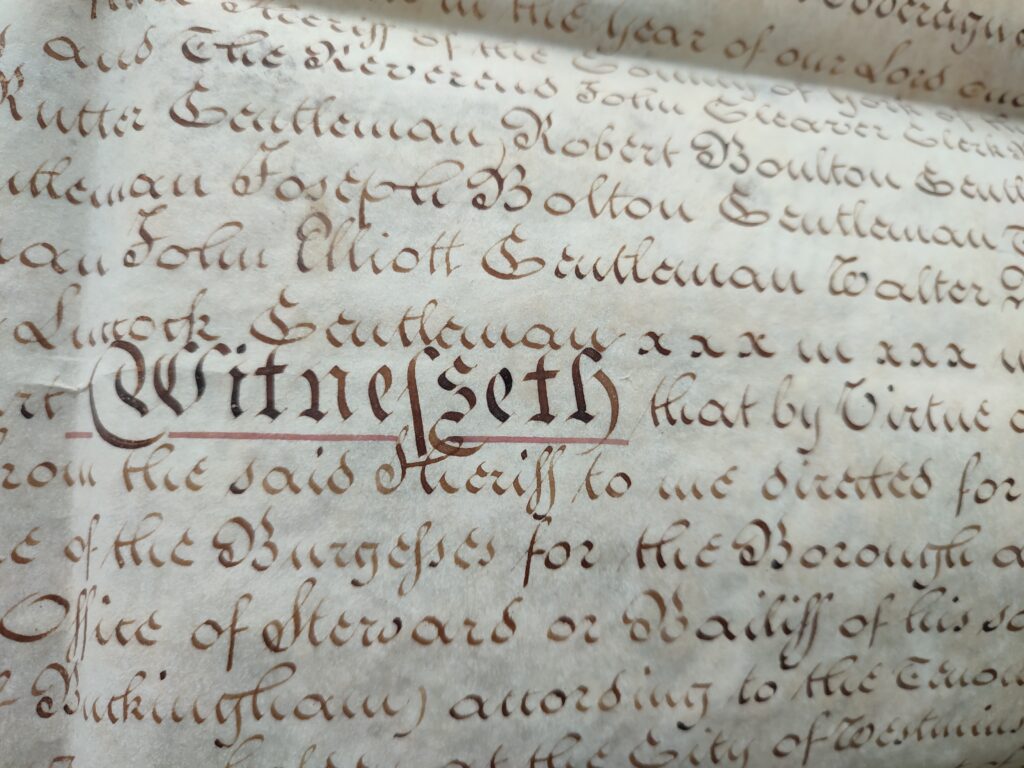
Here are some parts from the contract which confirmed William Weddell’s right to a seat in the House of Commons in 1784 on behalf of the borough of Malton :
“This Indenture made the Tenth day of August in the Twentyfourth year of Reign of our Sovereign Lord George the Third King of Great Britain and so forth and in the year of our Lord One Thousand Seven Hundred and Eightyfour Between William Danby Esquire Sheriff of the County of York of the one part and James Preston Borough Bailiff of Malton in the said County and the Reverend John Cleaver (+ many names) (…) and others Burgesses of the said Borough then and there present of the other part Witnesseseth that by Virtue of his said Majesty’s writt to the said Sheriff (…) and by Virtue of a precept thereupon from the said Sheriff to we directed for the choosing (…) Borough of Malton aforesaid (the person mentioned earlier strictly/only) have chosen William Weddell Esquire and Burgess (citizen of the Borough) to serve in the said Parliament for the Borough And have given and granted to the said Burgess full and efficient power for themselves and the commonality of the said Borough to do and Consent to those things which in the said parliament by the blessings of God, shall happen to be oredered according to the Tenour of the said writt and precept in witness whose of to the one part of these Indentures the said Sheriff hath put to the Seal of his office and to the other part of these Indentures and the Bailiff and Burgesses whost Names are hereunto Subscribed have hereunto set their hands and Seals the day and first above written” Signed William Danby Sheriff
References
Most of the references can be found in blue print in the text. The blue text is also a link to the relevant reference.
Photo
All photos were taken by Kjartan Skogly Kversøy